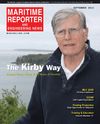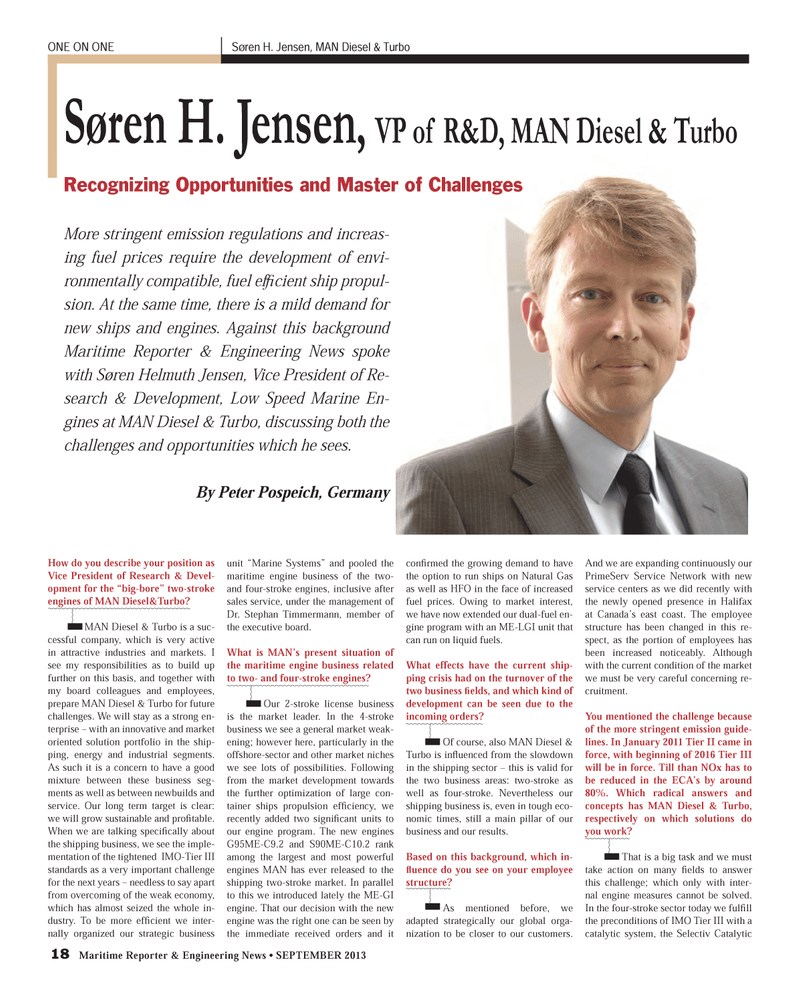
Page 18: of Maritime Reporter Magazine (September 2013)
Workboat Annual
Read this page in Pdf, Flash or Html5 edition of September 2013 Maritime Reporter Magazine
18 Maritime Reporter & Engineering News ? SEPTEMBER 2013 ONE ON ONE Søren H. Jensen, MAN Diesel & Turbo How do you describe your position as Vice President of Research & Devel- opment for the ?big-bore? two-stroke engines of MAN Diesel&Turbo? MAN Diesel & Turbo is a suc- cessful company, which is very active in attractive industries and markets. I see my responsibilities as to build up further on this basis, and together with my board colleagues and employees, prepare MAN Diesel & Turbo for future challenges. We will stay as a strong en- terprise ? with an innovative and market oriented solution portfolio in the ship-ping, energy and industrial segments. As such it is a concern to have a good mixture between these business seg-ments as well as between newbuilds and service. Our long term target is clear: we will grow sustainable and proÞ table.When we are talking speciÞ cally about the shipping business, we see the imple-mentation of the tightened IMO-Tier III standards as a very important challenge for the next years ? needless to say apart from overcoming of the weak economy, which has almost seized the whole in-dustry. To be more ef Þ cient we inter- nally organized our strategic business unit ?Marine Systems? and pooled the maritime engine business of the two- and four-stroke engines, inclusive after sales service, under the management of Dr. Stephan Timmermann, member of the executive board.What is MAN?s present situation of the maritime engine business related to two- and four-stroke engines? Our 2-stroke license business is the market leader. In the 4-stroke business we see a general market weak-ening; however here, particularly in the offshore-sector and other market niches we see lots of possibilities. Following from the market development towards the further optimization of large con- tainer ships propulsion efÞ ciency, we recently added two signiÞ cant units to our engine program. The new engines G95ME-C9.2 and S90ME-C10.2 rank among the largest and most powerful engines MAN has ever released to the shipping two-stroke market. In parallel to this we introduced lately the ME-GI engine. That our decision with the new engine was the right one can be seen by the immediate received orders and it conÞ rmed the growing demand to have the option to run ships on Natural Gas as well as HFO in the face of increased fuel prices. Owing to market interest, we have now extended our dual-fuel en-gine program with an ME-LGI unit that can run on liquid fuels.What effects have the current ship- ping crisis had on the turnover of the two business Þ elds, and which kind of development can be seen due to the incoming orders? Of course, also MAN Diesel & Turbo is inß uenced from the slowdown in the shipping sector ? this is valid for the two business areas: two-stroke as well as four-stroke. Nevertheless our shipping business is, even in tough eco-nomic times, still a main pillar of our business and our results.Based on this background, which in- ß uence do you see on your employee structure? As mentioned before, we adapted strategically our global orga-nization to be closer to our customers. And we are expanding continuously our PrimeServ Service Network with new service centers as we did recently with the newly opened presence in Halifax at Canada?s east coast. The employee structure has been changed in this re-spect, as the portion of employees has been increased noticeably. Although with the current condition of the market we must be very careful concerning re-cruitment. You mentioned the challenge because of the more stringent emission guide-lines. In January 2011 Tier II came in force, with beginning of 2016 Tier III will be in force. Till than NOx has to be reduced in the ECA?s by around 80%. Which radical answers and concepts has MAN Diesel & Turbo, respectively on which solutions do you work? That is a big task and we must take action on many Þ elds to answer this challenge; which only with inter- nal engine measures cannot be solved. In the four-stroke sector today we ful Þ ll the preconditions of IMO Tier III with a catalytic system, the Selectiv Catalytic More stringent emission regulations and increas- ing fuel prices require the development of envi- ronmentally compatible, fuel ef Þ cient ship propul- sion. At the same time, there is a mild demand for new ships and engines. Against this background Maritime Reporter & Engineering News spoke with Søren Helmuth Jensen, Vice President of Re- search & Development, Low Speed Marine En- gines at MAN Diesel & Turbo, discussing both the challenges and opportunities which he sees.By Peter Pospeich, GermanySøren H. Jensen , VP of R&D, MAN Diesel & Turbo Recognizing Opportunities and Master of ChallengesMR #9 (18-25).indd 18MR #9 (18-25).indd 188/30/2013 9:20:43 AM8/30/2013 9:20:43 AM

 17
17

 19
19
